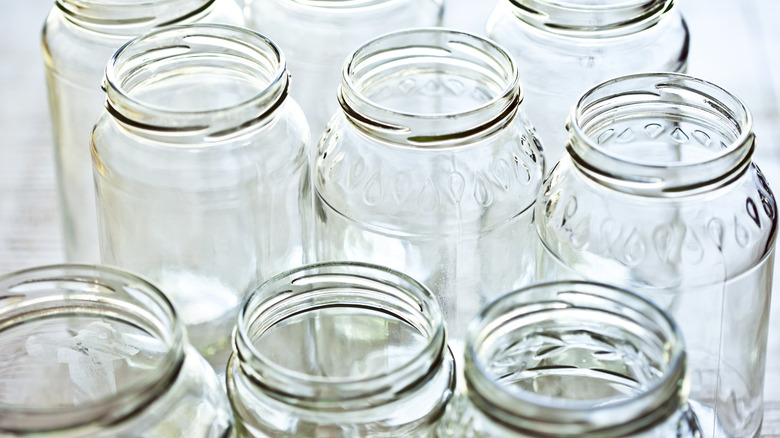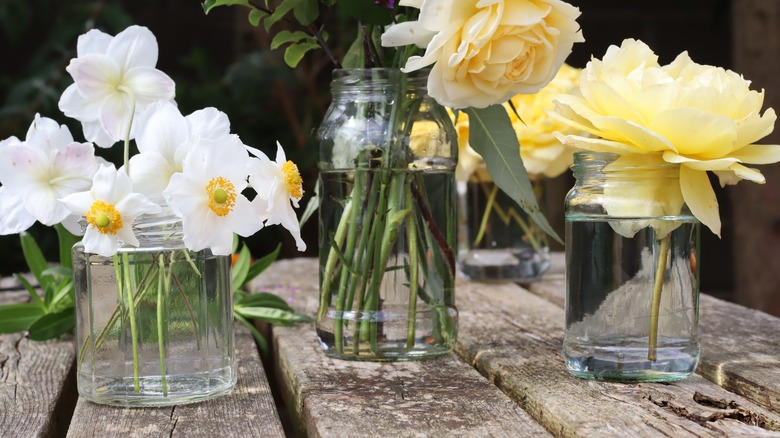This Simple Oven Trick Sterilizes Your Jars In No Time
A jar, especially an up-cycled jar, makes for a cute, free (or cheap), and super long-lasting storage receptacle for all kinds of knick-knacks. But before you repurpose jars for clever storage in every room of your home, you need to think about making said jars safe from hungry insects or stuff-ruining mold. There are tons of wee whatsits you may need a sterilized storage environment for, from the plant tags you use to mark vulnerable, newly planted seeds to your prized collection of Bakelite buttons. If you plan to use your sparkling clean jars for non-food storage, the oven sterilization method goes like this: Wash the jars and place them in a preheated warm (not hot) oven for up to 20 minutes. Oh so simple, right?
Before spinning the dials on your oven to hot and plonking a bunch of jars in there, there's a few safety issues to review. For one, trying out this method could be physically dangerous. Glass jars can be vulnerable to thermal shock and possibly break in the oven. Canning or mason jars, as well as the jars your store-bought jelly comes in, are manufactured with annealed, not tempered, glass. This means they're more susceptible to cracking, breaking, or shattering with rapid temperature changes. Still, they can technically withstand temperatures up to 392 degrees Fahrenheit, though below 266 degrees Fahrenheit is safer, so long as they're put into the oven while it's warm (not hot) and heated slowly.
How to sterilize jars for non-food storage in the oven
If you wish to attempt this method for doubling your houseplant collection with old glass jars you already own or reorganizing all those bits and bobs in your sewing room, here's how. Preheat the oven to a maximum of 275 degrees Fahrenheit (any hotter and you risk breakages), and prepare an oven tray large enough to comfortably fit all your jars by lining it with a few sheets of newspaper. Remove the rubber seals and lids from the jars, if they have them, and put them to one side. You wouldn't want these to accidentally end up in a hot oven!
Wash all your jars in hot, soapy water — regular dish soap works fine here. Some sources say to dry the jars after washing them, while others advise leaving them damp; feel free to experiment with this step. While the jars are still warm from the wash, set them out on the baking tray and slide everything into the oven, closing the door once they're inside. Set a timer for between 10 and 20 minutes — advice on time varies. Once the buzzer goes off, put on a pair of thick oven mitts and, if you're really safety conscious, a pair of goggles, and remove the tray from the oven. Leave the jars on the tray until cool to the touch; don't place them on a cold kitchen counter or, again, you're courting that dastardly glass enemy: thermal shock.
Oven jar sterilization and food preservation safety issues
Where food preservation, or canning, is concerned, oven sterilization is a somewhat controversial topic. Food safety authorities in the U.S. and Canada universally consider sterilizing jars in the oven unsafe for a number of reasons, as do many jar manufacturers (like Ball). There's the aforementioned potential for breakage, but there's also no way to be sure you've killed off all those food-ruining germs given the lack of temperature consistency across oven brands. Dry canning — that is, placing dry food in jars, putting the lids on, and heating everything in the oven to a recommended temperature — is also deemed unsafe by the U.S.D.A.
Put simply, it's good practice to avoid the oven jar sterilization method for food storage — wet or dry. That being said, you could sterilize and use new or old glass jars for, say, home office storage — basically, anything you don't put in your mouth that's susceptible to being eaten or ruined by bugs, mold, or bacteria. Most bacteria die when exposed to temperatures above 160 degrees Fahrenheit, and above 140 to 160 degrees Fahrenheit for most yeasts and molds. Most insects will perish in temperatures exceeding 120 to 140 degrees Fahrenheit. When it comes to safe storage in an oven-sterilized glass jar, think homemade cosmetics and cleaning supplies; arts and craft supplies; fabric off-cuts and notions; grain spawn for mushroom cultivation; saved seeds; cuttings you're rooting (before adding water to the jar) or cut flowers; and houseplant growing mediums.

